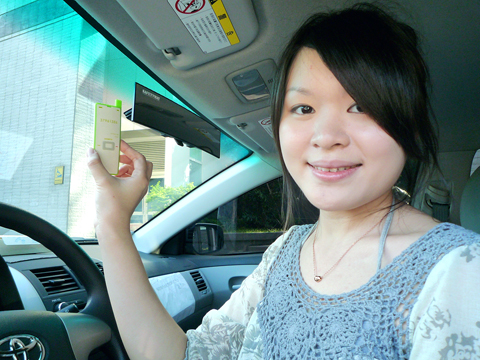Have you ever had the experience of seeing your mobile phone flying out of its holder when turning your car? If you do, a “sticky phone” may be your solution.
The design by National Taiwan University of Science and Technology (NTUST) student Liu Hsiang-ling (劉香伶) is one of this year’s winners of the iF concept award, which was announced recently by the Hanover-based International Forum Design GmbH (iF).
The mobile phone is made of polysiloxane and has solar panels installed on the back. Liu said she came up with the idea for the phone from her own driving experience. The device, which can be stuck to a window, will stay put while the car is in motion and can be recharged by absorbing sunlight through the windshield.

PHOTO: CHEN HSUAN-YU, TAIPEI TIMES
“I drive to school everyday and I have always had the idea of having my mobile phone stick to the window glass, just like a doll,” Liu said.
The iF concept award, which was started last year, is an international competition for new talent that is open to students in the fields of design and architecture.
A total of 3,221 concepts and ideas were submitted by students from 39 countries this year.
Nine of the concepts contributed by Taiwanese students were included in the “Best 100” list announced last month by iF, making the country one of the biggest winners of the annual event.
Three of the nine concepts were by students from NTUST. The “iF University Ranking” system ranked NTUST in second place based on the performance of contestants in the iF concept award over a period of two years.
Two other NTUST winners were Yeh Ming-hong (葉銘泓) and Lai Chung-ping (賴忠平), who designed “eat clean” tableware.
The “eat clean” design was intended as a solution for people who feel uncomfortable about using cutlery that has been in contact with the tabletop. The design, which combines the special shape and weight principle of a seesaw, enables the parts of the cutlery in contact with the mouth to always stay away from the tabletop, whichever way the cutlery is placed.
Another of this year’s winners was a “braille scanner” by Wang Fu-hua from Tainan National University of the Arts. The design, a mobile phone intended for the visually impaired that can convert braille into audible speech, was given 28th place out of the “Best 100,” which shared 30,000 euros (US$40,000) in prize money.
Designs by other Taiwanese students on the “Best 100” list included the “so sweet” clinical thermometer, which turns the instrument into a lollipop with a sweet coating that melts on contact with saliva, giving users a pleasant experience while having their temperature taken.
Another design was the “rabbit hanger,” which is a clothes hanger that doubles up as a tool for putting on clothes and shoes. On one end of the hanger is a zipper pull and on the other a shoehorn.
The “freedle” was a needle equipped with an eye made of soft flexible nylon that allows thread to be pulled through more easily. Also, the needle’s fluorescent material makes it easier to find if it drops onto the floor or somewhere dark.
The “plug for visually impaired” was a set of tracks leading to an electric socket that allows visually impaired people to insert a plug more easily.
The “so water” was a shower fittings with a new style of faucet that helps users avoid being splashed when they forget to switch the shower over before using the tap.

An essay competition jointly organized by a local writing society and a publisher affiliated with the Chinese Communist Party (CCP) might have contravened the Act Governing Relations Between the People of the Taiwan Area and the Mainland Area (臺灣地區與大陸地區人民關係條例), the Mainland Affairs Council (MAC) said on Thursday. “In this case, the partner organization is clearly an agency under the CCP’s Fujian Provincial Committee,” MAC Deputy Minister and spokesperson Liang Wen-chieh (梁文傑) said at a news briefing in Taipei. “It also involves bringing Taiwanese students to China with all-expenses-paid arrangements to attend award ceremonies and camps,” Liang said. Those two “characteristics” are typically sufficient

A magnitude 5.9 earthquake that struck about 33km off the coast of Hualien City was the "main shock" in a series of quakes in the area, with aftershocks expected over the next three days, the Central Weather Administration (CWA) said yesterday. Prior to the magnitude 5.9 quake shaking most of Taiwan at 6:53pm yesterday, six other earthquakes stronger than a magnitude of 4, starting with a magnitude 5.5 quake at 6:09pm, occurred in the area. CWA Seismological Center Director Wu Chien-fu (吳健富) confirmed that the quakes were all part of the same series and that the magnitude 5.5 temblor was

The brilliant blue waters, thick foliage and bucolic atmosphere on this seemingly idyllic archipelago deep in the Pacific Ocean belie the key role it now plays in a titanic geopolitical struggle. Palau is again on the front line as China, and the US and its allies prepare their forces in an intensifying contest for control over the Asia-Pacific region. The democratic nation of just 17,000 people hosts US-controlled airstrips and soon-to-be-completed radar installations that the US military describes as “critical” to monitoring vast swathes of water and airspace. It is also a key piece of the second island chain, a string of

The Central Weather Administration has issued a heat alert for southeastern Taiwan, warning of temperatures as high as 36°C today, while alerting some coastal areas of strong winds later in the day. Kaohsiung’s Neimen District (內門) and Pingtung County’s Neipu Township (內埔) are under an orange heat alert, which warns of temperatures as high as 36°C for three consecutive days, the CWA said, citing southwest winds. The heat would also extend to Tainan’s Nansi (楠西) and Yujing (玉井) districts, as well as Pingtung’s Gaoshu (高樹), Yanpu (鹽埔) and Majia (瑪家) townships, it said, forecasting highs of up to 36°C in those areas